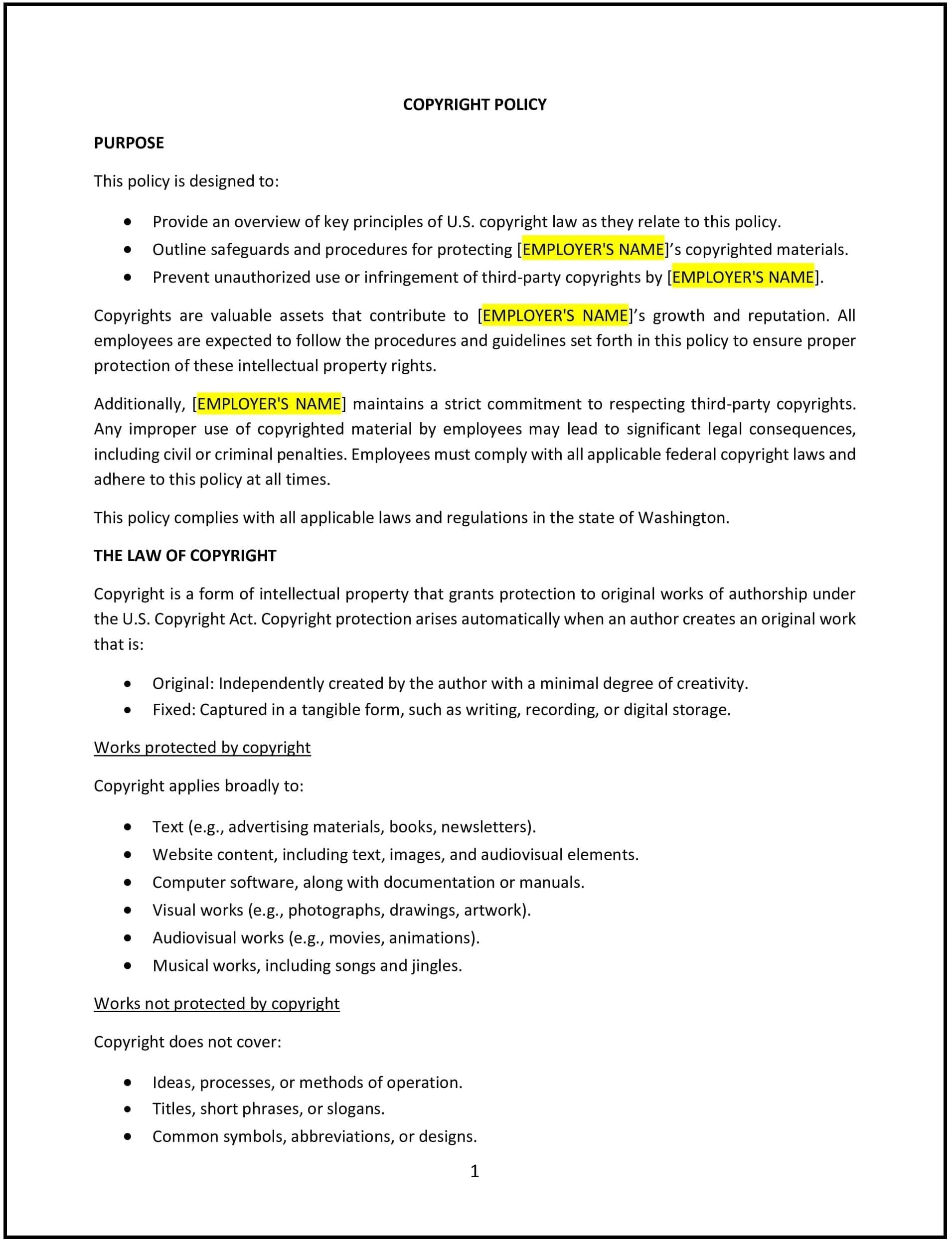Got contracts to review? While you're here for policies, let Cobrief make contract review effortless—start your free review now.

Customize this template for free
This copyright policy is designed to help Washington businesses understand their rights and responsibilities regarding copyright-protected works. It outlines how to use, distribute, and protect copyrighted materials, both owned by the company and others. The policy also provides guidance on how to handle copyright infringement claims and how to ensure that the company complies with copyright laws, including those under the U.S. Copyright Act and Washington state regulations.
By adopting this policy, businesses can protect their intellectual property, avoid unintentional infringement, and ensure that they respect the rights of other copyright holders.
How to use this copyright policy (Washington)
- Define copyrightable works: Clearly outline the types of works that are considered copyrighted, including original creative works such as software, marketing materials, images, videos, written content, and any other materials created by the company.
- Address the use of third-party copyrighted materials: Specify how employees should handle third-party copyrighted works, including obtaining permission or licenses to use materials owned by others. The policy should clarify the need to respect copyright laws and avoid using unlicensed works.
- Explain fair use: Provide guidelines for understanding the concept of fair use in copyright law, particularly in situations where the use of copyrighted works may be allowed without permission for purposes such as commentary, criticism, research, or education. The policy should outline when fair use applies and when it does not.
- Outline the process for obtaining permission: The policy should detail the process for obtaining permission or licenses to use third-party copyrighted works. This may include steps for contacting copyright holders, negotiating licensing agreements, and documenting permission.
- Specify handling of copyright infringement: Establish the process for addressing claims of copyright infringement, including how employees should report suspected infringement, how the company will respond to infringement claims, and the consequences of violating copyright laws.
- Protect the company’s intellectual property: Outline steps for employees to protect the company’s copyrighted works, including registering works with the U.S. Copyright Office, marking works with copyright notices, and taking action against unauthorized use of the company’s intellectual property.
- Promote compliance with Washington and federal laws: The policy must comply with Washington state copyright laws, federal regulations, and international copyright treaties. It should ensure that the company respects intellectual property rights and adheres to all legal requirements.
- Review and update regularly: Periodically review and update the policy to ensure it remains compliant with changes in copyright laws, industry standards, and the company’s practices.
Benefits of using this copyright policy (Washington)
This policy offers several benefits for Washington businesses:
- Protects intellectual property: The policy helps ensure that the company’s copyrighted works are protected from unauthorized use or infringement, safeguarding its valuable intellectual property.
- Reduces the risk of legal issues: By following the policy, businesses can minimize the risk of copyright infringement claims, which could result in costly lawsuits or damage to the company’s reputation.
- Promotes respect for third-party copyrights: The policy ensures that employees understand their obligations regarding third-party copyrighted works, reducing the risk of unintentional infringement and fostering a culture of respect for intellectual property rights.
- Increases employee awareness: By establishing clear guidelines for handling copyrighted materials, the policy increases awareness among employees about the importance of copyright and intellectual property protection.
- Supports business relationships: By respecting the copyrights of others and obtaining necessary licenses, businesses can build positive relationships with content creators, licensors, and other stakeholders in the industry.
- Promotes legal and regulatory compliance: The policy helps businesses comply with Washington state and federal copyright laws, as well as international treaties, supporting the company’s legal standing and reputation.
Tips for using this copyright policy (Washington)
- Communicate the policy clearly: Ensure that all employees understand the company’s stance on copyright and their responsibilities under the policy. Include the policy in the employee handbook, review it during onboarding, and provide ongoing training on copyright issues.
- Monitor the use of copyrighted works: Regularly monitor how employees are using copyrighted works, particularly third-party materials, to ensure compliance with the policy. Use technology tools to track the usage of company intellectual property and third-party content.
- Obtain licenses for third-party works: Before using third-party copyrighted materials, ensure that the appropriate permissions or licenses are obtained. This could involve contacting copyright holders, negotiating agreements, and documenting the terms of use.
- Protect company intellectual property: Take proactive steps to protect the company’s intellectual property, including registering works, marking materials with copyright notices, and taking action against unauthorized use.
- Review and update regularly: Periodically review the policy to ensure it remains compliant with Washington state laws, federal regulations, and any changes in the company’s operations or intellectual property needs.